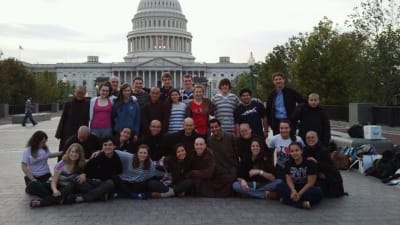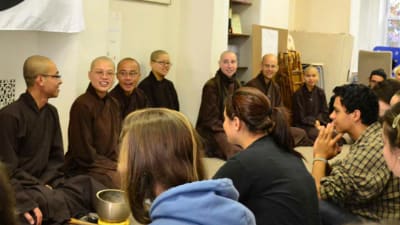The Odyssey
What if you could design your own case study? Our students confronted this question over the last two weeks during what is fast becoming an SEGL signature experience: the Odyssey. On the first Monday of the experience, students filled out an extensive personal inventory: Where do you come from? What are your hopes and fears? Where do you want to go? Our staff then created a personalized three-stop journey for each student. On Wednesday, students embarked on their journeys. For example, a student with an interest in religion and civil rights might visit James Hampton’s folk art classic “The Throne of the Third Heaven of the Nations’ Millennium General Assembly” at the National Museum of American Art, the Greensboro sit-in lunch counter at the Smithsonian American History Museum, and the new Martin Luther King, Jr. Memorial. At each stop along the way, they opened a sealed envelope with a question for reflection, and wrote in their journals. (Although students traveled independently on this day, teachers were also placed strategically around the city in case of emergency, and students kept faculty aware of their whereabouts throughout the day.) Wednesday ended with a Quaker-style meeting in which students sat together silently and, as they felt moved to speak, shared thoughts on the day.
On Friday, each student began planning a day-long case study for the following Friday. Topics included everything from the DREAM act, to the famine in the Horn of Africa, to No Child Left Behind. In the process of creating their Odyssey day, each of our students gained new skills: How do you use your networks to schedule meetings? How do you write an email asking for a meeting? How do you make a phone call? What do you say when the answer seems to be no? What questions do you ask in a meeting? How do you follow up on meetings?
On the following Wednesday morning, we took a detour that helped enrich
the Odyssey experience: a few hours of (secular) meditation with monks
and nuns from the school of Eastern philosopher Thich Nhat Hahn as our
guides. (Thich Nhat Hahn is arguably the most well-known Buddhist thinker after
the Dalai Lama.) Our guests presented their method for coping with
stress and strong emotions–something every SEGL student faces, and will
face as a leader. One comic “only at SEGL” moment occurred just before
lunch–Ambassador Mark Dybul, the former U.S. Global AIDS Coordinator who
is a guest speaker each semester, ran into the students during a
“walking meditation” exercise in Dupont Circle. And at the end of the
day the students ran into the monks and nuns again on the Metro. It
turned out the Thich Nhat Hahn was speaking at the Library of Congress
in a special invitation-only event. Over half of the students were able
to sit in on part of the session.
(Thich Nhat Hahn is arguably the most well-known Buddhist thinker after
the Dalai Lama.) Our guests presented their method for coping with
stress and strong emotions–something every SEGL student faces, and will
face as a leader. One comic “only at SEGL” moment occurred just before
lunch–Ambassador Mark Dybul, the former U.S. Global AIDS Coordinator who
is a guest speaker each semester, ran into the students during a
“walking meditation” exercise in Dupont Circle. And at the end of the
day the students ran into the monks and nuns again on the Metro. It
turned out the Thich Nhat Hahn was speaking at the Library of Congress
in a special invitation-only event. Over half of the students were able
to sit in on part of the session.
Friday was packed with learning: phone calls and meetings (scheduled and unscheduled), challenges and successes, insights and questions. It was especially impressive to see how many students created something extra on Friday through sheer determination and creative thinking. Even the failures provided important lessons (don’t show up at the Bolivian Embassy if you haven’t written back to confirm your visit!).
Meanwhile, at least two classes connected the Odyssey to the week’s coursework. In English, students are authoring op-ed pieces on their Odyssey topic. And in U.S. History students are sending historical figures from the pre-Civil War era on “odysseys” and then coming dressed as those figures to class for a simulated Quaker-style meeting. (Can you imagine what John Calhoun might say after visiting the Lincoln Memorial?)
On Friday night we surprised the students with another SEGL tradition: a road trip “odyssey” to one of the largest corn mazes in North America. With flashlights and good cheer (despite a light rain and cold weather) we braved the maze, and then made s’mores and sang songs together around a bright campfire. I have learned that road trips are amazing for group dynamics, and this trip was no different.
Next week is another big week: On Monday we begin the first of three Capstone projects–the collaborative policy document–and host Sudanese rap star and former child soldier and “Lost Boy” Emmanuel Jal for what promises to be an exciting talk and performance. On Wednesday we visit the George Washington University library for a day of research. We will write about it soon!







